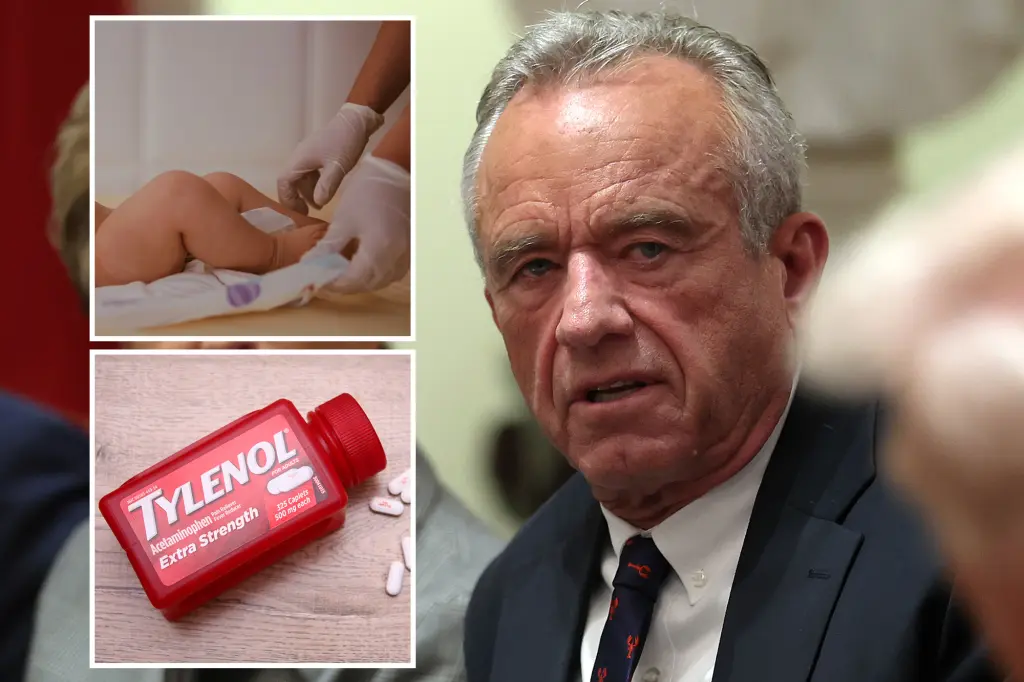The Ongoing Debate Over Autism’s Causes: Separating Facts from Theories
In a recent Cabinet meeting, Health and Human Services Secretary Robert F. Kennedy Jr. proposed a controversial theory connecting infant circumcision, Tylenol use, and autism. “There’s two studies which show children who are circumcised early have double the rate of autism. It’s highly likely because they were given Tylenol,” Kennedy stated. This claim follows President Trump’s own recent warnings about acetaminophen (Tylenol’s active ingredient) being potentially harmful to pregnant women and possibly increasing autism risk in their children. These high-profile statements have sparked concern and confusion among parents and medical professionals alike, with many experts arguing that such claims oversimplify a complex condition and may cause unnecessary anxiety among families.
Medical professionals have responded with caution to these assertions. Dr. Robert Melillo, a neuroscientist with over 30 years of experience working with autism, acknowledged the good intentions behind the administration’s focus on autism but criticized their approach: “The messaging is terrible.” While Kennedy didn’t cite specific research, he likely referenced a 2015 Danish study that followed more than 340,000 boys and found a slightly higher autism rate among those who were circumcised by age 10. The study authors suggested that pain or stress from the procedure could potentially impact brain development, but they couldn’t determine if Tylenol was involved since they lacked data on medications used. Critics later described this research as “flawed” with significant limitations. Another study from 2013 compared national circumcision and autism rates across eight countries and found only a weak correlation without establishing causation. Dr. Melillo emphasized a fundamental problem with these discussions: “To really understand causation, you have to first explain what autism is and what is actually happening in the brain, and nobody is doing that at any level.”
Regarding Tylenol specifically, reproductive psychiatrist Dr. Sarah Oreck stated unequivocally: “There is no clear or conclusive evidence that the use of Tylenol (acetaminophen) during pregnancy causes autism.” This over-the-counter medication has been used safely for decades to treat pain and reduce fever, and remains one of the safest options for pregnant women and young children when used as directed. Dr. Melillo pointed out the logical flaw in the theory: “If you said that Tylenol causes autism, then first of all, any mom who ever took Tylenol should have a child with autism — and that’s clearly not the case.” Both experts suggested that researchers should focus more on what conditions are being treated with Tylenol rather than on the medication itself. Dr. Oreck explained: “People take acetaminophen when they have fevers, migraines or chronic pain. These conditions themselves affect the pregnant person and the fetus. The research couldn’t separate the medication from the illness being treated. It’s like blaming umbrellas for rain — just because they show up together.”
The question of circumcision’s relationship to autism rates was met with similar skepticism from medical experts. “That doesn’t make sense,” Dr. Melillo stated plainly, noting that circumcision has been practiced for thousands of years and not all children receive Tylenol afterward. Dr. Oreck added: “No credible scientific evidence supports this claim. The theory relies on weak correlations that do not establish causation, and it has not been validated through peer-reviewed research.” Dr. Melillo suggested that other early-life factors would be more concerning as potential contributors to autism, such as oxygen deprivation at birth, delivery trauma, or signs of an overactive immune system. “I think circumcision would be on the low end of it, and that’s why it’s surprising they’re making such a big deal about it,” he remarked, adding that “the messaging is confusing and creating a lot of anxiety.”
The broader context of autism research reveals a more nuanced picture than these singular theories suggest. Autism, which affects how people learn, behave, communicate and interact with others, is currently diagnosed in approximately 1 in 31 U.S. children—a rate that continues to rise. Dr. Melillo emphasized that many autism risk factors may be present long before pregnancy even begins. Research indicates that parental health conditions like obesity, high blood pressure, and diabetes in either parent might increase the risk of having a child with autism. “There is clearly an increase in autism, and some lifestyle and environmental factors are driving it,” Melillo explained. “But these are the same factors driving the rise in obesity, diabetes, hypertension, cancer and autoimmunity. They’re not specific to autism.” This perspective suggests that autism is likely influenced by a complex interplay of genetic predispositions and environmental factors, rather than any single cause like circumcision or Tylenol use.
The debate surrounding autism’s causes reflects a broader challenge in medical communication: balancing public interest in potential risk factors against the need for evidence-based information. While political figures like Kennedy and Trump have drawn attention to the issue of rising autism rates—a legitimate public health concern—medical experts caution against oversimplification of complex neurological conditions. The ongoing research into autism continues to reveal its multifaceted nature, with genetic, environmental, and developmental factors all potentially playing roles. For parents and caregivers navigating these discussions, the consistent advice from medical professionals remains to consult with healthcare providers about individual concerns, follow established medical guidelines for pregnancy and infant care, and approach singular theories about autism causation with healthy skepticism. As our understanding of autism continues to evolve, the focus should remain on improving early diagnosis, intervention, and support systems for those affected by autism spectrum disorders.


